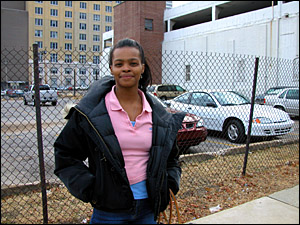 |
 | ||||||
|
Little wonder too. Take the high-interest payday loan business. Typically, customers write postdated checks and receive loan money up front. They return after payday to buy back the check or roll it over for another week or more. The typical fee for a $100 two-week payday loan is $15. Over the course of a year, that's a 391% annual percentage rate, calculates the AARP. With rates like that, or even higher, it's easy to get trapped in an endless cycle of debt.
"They speak all these finance charges, this rate and that rate, and when it actually comes down to it you're paying for something four or five times more than what you should be paying for it," explains Burks, a 29-year-old single mother of four. Burks could be easily mistaken for a college student with her slender frame and youthful face. "Luscious" is tattooed in cursive on the side of her neck. She says she moved out at age 19 and wasn't careful about what loan agreements she signed. "I started getting bad credit when I was young, just not knowing," says Burks. "Because nobody told me that it's very crucial that you maintain your credit. Because your credit's like your word." She works as a customer service rep making $10 an hour. Her debt is equal to a year's wages, mostly for some student loans, back rent, and those furniture rental stores. Creditors were hounding her for payment. "I'd get them calling and they'd be like, 'Is your name Maria Burks?' And I'd be like, 'Yeah.' And, 'Is your social...' and I'm like, 'No, that's not me,'" Burks laughs. "'That's not me.' But they'll find you. So, it'll feel good not to have to have those calls in the middle of the night." Burks says the hounding started to take its toll. "It's very depressing when all you can think about is, you know, trying to keep your head above water," says Burks. "I hope bankruptcy will give me a fresh start so I can go about owning my own home for me and my children." Maria Burks dreams of finishing college, maybe starting her own beauty salon. Burks isn't the only one in her circle to have filed. Her sister went broke. So did an older brother. So have friends. So she wants to play her part in ending the local bankruptcy cycle. She is teaching her younger brother the importance of good credit. "All it takes is someone to actually explain to somebody that, especially being young, the things to stay away from so that they don't mess their credit up," says Burks. Back in the Memphis bankruptcy building, Trustee George Stevenson continues dealing with a steady stream of people. He's mediating their cases, modifying the terms of their plans, consulting with their lawyers. Still, despite great effort by clients and the court, nationwide, only a little more than a third of Chapter 13 filers successfully complete their financial reorganization. If they can't make their payments, they could lose bankruptcy protection. Creditors can swoop back in, foreclose on their home or repossess the car. This morning, an older woman patiently waits until her case is called, and then she approaches Trustee Stevenson with a smile. She's beaten the odds. "You've been on the case since 2001. That's a long time," notes Stevenson. "Yes, sir, a long time," the woman agrees. "Looks like you've paid in over $24,000 on your case," says Stevenson. "You've got your car paid. Everyone's been paid. And what we're trying to do is to get the case completed, aren't we today?" "Yes, sir," smiles the woman. Stevenson congratulates her, "OK, well we're going to show that we're going to be able to go ahead and get it complete and get you a discharge. Congratulations! Good luck to you." "Thank you. I'm blessed. I'm glad," she says. "Hope I don't see you down here anymore!" Stevenson jokes. She laughs. "I'm going to give you a high five." And she does.
Back to Bankrupt: Maxed Out in America |
||||||
 |
||||||
